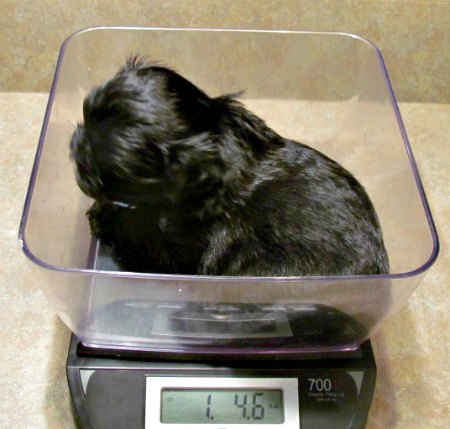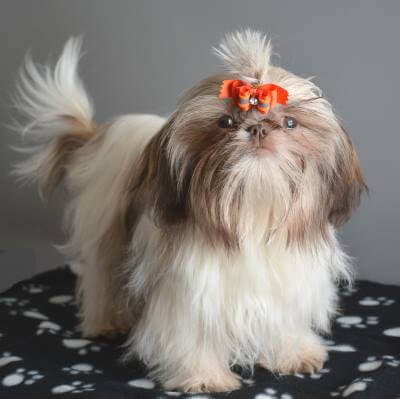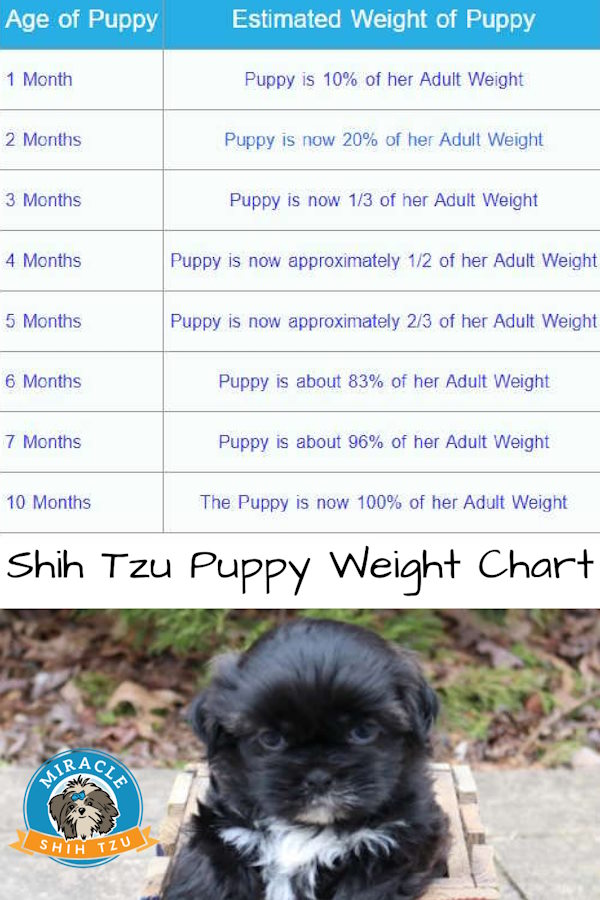- Home
- Puppy Information
- Shih Tzu Puppy Weight Chart
Shih Tzu Puppy Weight Chart
Shih Tzu Puppy Weight Chart by Janice Jones
One of the first questions that Shih Tzu puppy buyers ask is, "How big will this puppy be when it is fully grown?" There are legitimate reasons for knowing what to expect. Some people want a dog on the smaller side because they can't manage a bigger dog. Others with small children may wish to have a bigger, more sturdy dog to cope with the rambunctious kids at play.
Whether you want a Shih Tzu puppy that will grow to meet the AKC standards (9 to 16 pounds) or a smaller version, knowing your options and what to expect is essential.
Factors that Affect Shih Tzu Growth
Many issues will affect just how big your puppy will grow.
Genetics
Genetics and Parentage are probably the most significant factors, but don't rule out the nurture part of the nature-nurture equation. There are many ways that a puppy may stray from the parent's size. Remember, too, that your puppy's parents are intact, and dogs that have not been spayed or neutered tend to be thinner than they might be if fixed. The reason this is true is because neutering alters your dog’s hormonal balance, which can lead to their metabolism slowing down.
Your puppy shares part of the DNA that the parents provide and maternal and paternal grandparents. As you go farther back into the pedigree, the ancestors have less effect on the current generation, but there is still that trace DNA.
Exercise and Activity levels
Anyone who has ever had more than one Shih Tzu knows that no two are exactly alike and may vary significantly in many different ways. All puppies have a lot of energy, so you can't always go by how active your puppy is compared to how they will become as adults.
Most, if not all, of my Shih Tzu dogs slow down as they age, but not always at the same rate. I've had highly active dogs at 14 years of age, and some of them turn into couch potatoes at three years of age. If you have a highly active Shih Tzu who likes to exercise regularly, they will either need more food or tend to be slender.
Nutrition and Feeding
Again, this is a no-brainer. Some dogs have a great appetite and will eat everything in sight. Others are so picky that it takes great ingenuity to find food they will eat. Extra table scraps and treats all add to the total daily caloric intake. They are just like us.
Overall Health
If a Shih Tzu enjoys optimal health, he's also likely to achieve his ideal weight as an adult. Any health concerns may add to or take away from his perfect size.
Early Environmental Factors
By environment, I am referring to the in-utero, early environment, and the environment you provide once the puppy is ready to go home. Large litters can be problematic because greater competition exists for the growing fetus. Sometimes, puppies are born smaller than others due to their location in the womb. A research project published in Science Direct, found that puppy weight decreased with increasing litter size.
Neonates born small will have more difficulty competing with their more robust litter mates for their mother's milk and may need assistance to survive. In my personal experience, I have found that it is possible for the smallest puppy in the litter (the runt) to catch up to his litter mates and often pass them in size with proper care. Likewise, a litter of one or two can have the opposite effect. Sometimes, these puppies, especially singletons, become larger than their patterns when they are fully grown because they do not need to compete for resources.
Understanding Shih Tzu Size Categories
Shih Tzu dogs come in different sizes, but unlike the poodle breed, which does have official AKC size designations (Toy, Miniature, Standard), Shih Tzu do not.
Any terms you may have heard for the Shih Tzu breed, such as teacup, imperial, Chinese imperial, toy, and so forth, are just names made up by breeders who hope to charge more for their puppies. They market these little dogs as unique or special in some way. Assume that anyone who uses this type of terminology is just feeding you "fake news."
There is some anecdotal evidence that the term Chinese Imperial may describe dogs smaller than the standard Shih Tzu. Most of this is shrouded in mystery and arises from information from historical documents from China long before the modern development of the breed. Whether this is true is a matter of opinion, and the jury is still out on this "theory."
The smallest Shih Tzu I have had was 3 pounds, and the largest was 22 pounds. Both came from other breeders. The largest one had a heavy European ancestry, and many Shih Tzu dogs from Russia and Eastern Europe tend to be larger. By larger, I don't mean fat; I mean bigger boned and possessing a stocky skeleton. The smallest one came from a breeder who intentionally bred for small size. Many breeders like to do this.
In my humble opinion, if you have a choice, go for the larger dog, as the smaller ones can have problems. I'll share my sad story with my 3-pound Shih Tzu in a moment. Tiny Shih Tzu puppies can have issues from day one, including hypoglycemia and a fragile body structure.
If you are curious about puppy development, you will want to check out our two articles on the growth and development of puppies. Puppy Development Milestones and Puppy Development: An Overview.
Shih Tzu Puppy Weight Chart

Everyone wants to know how big their Shih Tzu puppy is going to be when they become an adult. A Shih Tzu dog obtains its adult weight between 9 and 12 months. Some will still gain weight especially if they take in more calories than they burn.
The growth rate in this breed is not uniform, but rather there are periods where the puppy grows faster than others. The first month, for example is a period of rapid weight gain, but once the puppy reaches 8 months or so, their weight gain slows.
Shih Tzu Puppy Weight Chart: Method One
After breeding and rearing countless litters of Shih Tzu over the years, and keeping accurate weight records, I have devised several ways that other breeders and puppy owners can estimate the weight that their dog will obtain by adulthood. This is my own research and there is no guarantee that the estimates will be accurate.
Quick Method of Estimating Shih Tzu Adult Weights
Eight Weeks Old: Weight X 3, plus 2-3 pounds = Adult Weight
EXAMPLE: If the puppy weighs 2 pounds at 8 weeks old, they are likely to be about 8 pounds as an adult
Twelve Week Old: Weight X 2 PLUS One Pound = Adult Weight
EXAMPLE: If the puppy weighs 3 pounds at 12 weeks of age, he will weigh about 7 pounds as an adult
Sixteen Weeks Old: Weight x 2 = Adult Weight
EXAMPLE: If the puppy weights 4 pounds at 16 weeks, he will weight about 8 pounds as an adult
Shih Tzu Puppy Weight Chart: Method Two
You can get an estimate of what size the puppy will be as an adult by using a traditional Shih Tzu Puppy Weight Chart. Often these figures end up being less than accurate.
| Age of Puppy | Estimated Weight of Puppy |
|---|---|
| 1 Month | Puppy is 10% of her Adult Weight |
| 2 Months | Puppy is now 20% of her Adult Weight |
| 3 Months | Puppy is now 1/3 of her Adult Weight |
| 4 Months | Puppy is now approximately 1/2 of her Adult Weight |
| 5 Months | Puppy is now approximately 2/3 of her Adult Weight |
| 6 Months | Puppy is about 83% of her Adult Weight |
| 7 Months | Puppy is about 96% of her Adult Weight |
| 10 Months | The Puppy is now 100% of her Adult Weight |
Living with Tiny Shih Tzu Dogs (Under the Standard Size)

Shih Tzu below the standard size are generally healthy but may have a smaller bone structure. Assuming that the small Shih Tzu is of normal weight and muscular, it is still vital to ensure a healthy lifestyle.
Some common health conditions and precautions should be noted.
- They may be prone to injury due to their body structure and bone density.
- Hypoglycemia is a major problem in very small puppies and can be life threatening. Please don’t allow them to go too long between meals.
- Hip dysplasia, stenotic nares and Luxating patella tend to occur more frequently in smaller sized dogs
- Dehydration may occur if the undersized dog does not drink enough water. Keep fresh water available at all times.
- Heart problems and liver shunts are common. Discuss these issues with your vet and know what symptoms to look for.
- Tiny Shih Tzu puppies may have trouble regulating their body temperature and will feel the cold more quickly than their normal-sized cousins. A small sweater or coat will be appreciated, and never leave your dog out in the cold.
If you are wondering about the weight of your adult dog, you may want to look at this BMI calculator for an estimated weight to determine whether he or she is over or underweight.

This is me, Janice, with my tiny three-pound Shih Tzu, Ketchikan, who helped me with this website.
I loved him so much, but he had his fair share of problems and passed away recently due to complications with Canine Flu.
I had adopted a rescue from a local SPCA and didn't find out until it was too late that she had some form of kennel cough. She spread it to all of my dogs and then died.
A few days later, Ketchikan passed away too. Ketchikan was nine years old when he died and suffered from other problems in his later days. The rest of the pack survived and recovered. They were all considerably larger than Ketch.
Shih Tzu Puppy Weight Chart: Pin for Future Reference
"Hi, I'm Janice Jones, a former veterinary technician and Shih Tzu expert with over 40 years of experience with the breed. Through Miracle Shih Tzu, I combine my medical background and extensive breed knowledge to provide reliable, practical advice for Shih Tzu owners. My mission is to help you give your Shih Tzu the happiest, healthiest life possible through evidence-based information and real-world solutions. Whether you're new to the breed or a seasoned owner, you'll find trusted guidance here for all aspects of Shih Tzu care.
I hold an undergraduate degree in Psychology with a minor in biology, Early Childhood Education, and Nursing, and a Master's in Mental Health Counseling.





